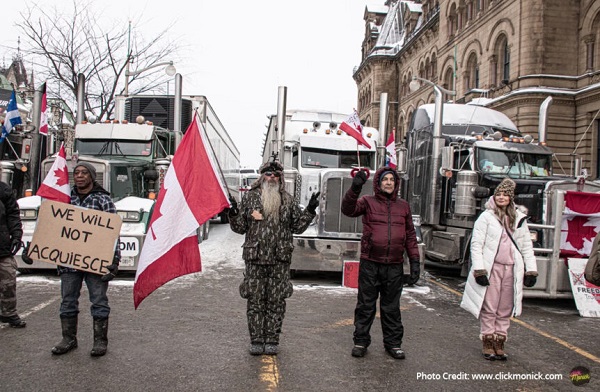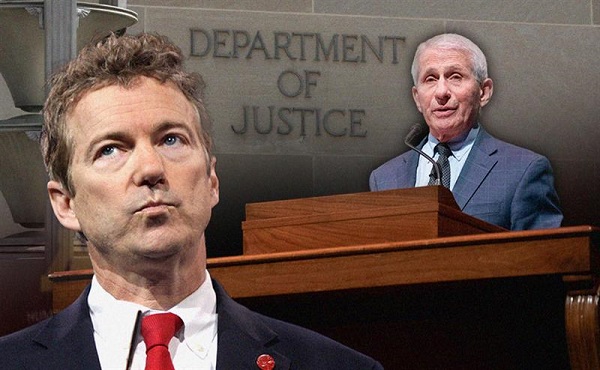COVID-19
Charges against Parliament Hill’s “Peace Man” withdrawn

News release from The Justice Centre for Constitutional Freedoms
He brought no vehicle and blocked no roads…. he was in the nation’s capital to encourage dialogue between the government and protestors.
The Justice Centre is pleased to announce that the charges against Dana-Lee Melfi, popularly known as “Peace Man,” were withdrawn on January 23, 2024. The federal government invoked the Emergencies Act on February 14, 2022. Mr. Melfi, who was in the nation’s capital during the Freedom Convoy protest, was arrested on February 19, 2022, during the police crackdown on protestors. He was charged with mischief, mischief to property, disobeying a lawful order, and obstructing justice. Peace Man was conspicuous in the crowd with his striking appearance. His flowing, grey hair and beard, sunglasses, and cameras drew significant media attention. Each day he would take up a peaceful stance near Parliament Hill, either draped in or carrying a large Canadian flag, to greet passersby with the two-fingered peace sign. He brought no vehicle and blocked no roads. He had said in various media interviews, with outlets like Canadian Press, New York Times, Washington Post, Epoch Times, and many independent media, that he was in the nation’s capital to encourage dialogue between the government and protestors. Mr. Melfi’s trial was scheduled for the week of January 22, 2024. Just days prior to the trial, a large number of social media videos were disclosed by the Crown as evidence against Mr. Melfi. Mr. Melfi’s lawyer, Monick Grenier, notified the Crown that she was contemplating filing a Late Disclosure Application if she was not successful in having the evidence excluded. Ms. Grenier was prepared to appeal to Section 24(2) of the Canadian Charter of Rights and Freedoms, which requires courts to exclude evidence from a trial if it can be established that its admission would bring the administration of justice into disrepute. She also raised the possibility of filing a Jordan Application, which protects Canadians from unreasonable trial delays. Adding to this complexity, the parties were advised the week before the trial that the Court was double booked. Mr. Melfi would not have been at fault for either potential delay. In 2016, the Supreme Court of Canada ruled that trials must be heard within 18 months of charges being laid in accordance with the Chartersection 11(b) right of Canadians “to be tried within a reasonable time.” What is commonly referred to as the “Freedom Convoy” protest has since, in fact, been recognized in another court proceeding as a combination of as many as 13 different protests. Mr. Melfi always considered himself to be carrying out his own personal protest. Monick Grenier, counsel for Mr. Melfi, stated, “My client stood in peace throughout the protest. After his arrest, Mr. Melfi was set to advance breaches of his rights under sections 8, 9 and 10 of the Canadian Charter of Rights and Freedoms. We are pleased with this outcome. “
COVID-19
Sen. Rand Paul: ‘I am officially re-referring Dr. Fauci to the DOJ’

Fr0m LifeSiteNews
‘Perjury is a crime,’ Sen. Rand Paul declared on X. ‘And Fauci must be held accountable.’
Sen. Rand Paul announced Monday that he is again pressuring the U.S. Department of Justice (DOJ) to launch a criminal probe of Dr. Anthony Fauci after The New York Times revealed his 11th-hour pardon by the Biden administration is likely invalid.
“Today, I will reissue my criminal referral of Anthony Fauci to Trump DOJ!” declared Paul, later adding, “Perjury is a crime. And Fauci must be held accountable.”
By late in the afternoon on Monday, the Kentucky senator had composed a letter to Attorney General Pam Bondi citing the times he believed Fauci had lied under oath during congressional hearings and urging the DOJ to finally investigate Fauci.
“In July 2023, I referred Dr. Anthony Fauci to the Department of Justice for lying under oath to Congress. His own emails directly contradicted his sworn testimony,” Paul wrote X.
“NYT reports Fauci was quietly pardoned by an autopen, operated by Biden’s staff. If the President didn’t authorize this pardon personally, then the Department has a duty to investigate and prosecute as it would any ordinary citizen,” Paul said.
“Fauci has been sainted by the extremist Left, but it doesn’t erase his lying before Congress,” Paul said. “I am officially re-referring Dr. Fauci to the DOJ.”
In July 2023, I referred Dr. Anthony Fauci to the Department of Justice for lying under oath to Congress. His own emails directly contradicted his sworn testimony.@NYT reports Fauci was quietly pardoned by an autopen, operated by Biden’s staff. If the President didn’t authorize… pic.twitter.com/j0wrt6QdoJ
— Senator Rand Paul (@SenRandPaul) July 14, 2025
Sen. Paul concluded his letter to Bondi by explaining that his autopen pardon is now seen to be illegitimate:
On January 19, 2025, Dr. Fauci was issued a full and unconditional pardon for any offenses that he may have committed or taken part in since 2014. Dr. Fauci was included among a group of individuals granted unprecedented preemptive pardons on President Joe Biden’s final day in office. However, new information has revealed that these pardons were executed via autopen, with no documented confirmation that the President personally reviewed or approved each individual grant of clemency.
According to reports, White House staff authorized the use of the autopen to issue the clemency documents. This raises serious constitutional and legal concerns about the legitimacy of Dr. Fauci’s Pardon.
President Donald Trump told reporters on Monday that the constant reliance on the autopen by the Biden administration is “one of the biggest scandals that we’ve had in 50 to 100 years.”
“I guarantee (Biden) knew nothing about what he was signing,” Trump asserted.
“I guarantee it,” he emphasized.
Fauci’s mendacious relationship with Congress
The senator from the Bluegrass State and Dr. Fauci have long had a combative relationship.
In 2021, Sen. Paul alleged that Fauci, who then served as director of the National Institutes of Allergy and Infectious Disease (NIAID) and as medical adviser to former President Joe Biden, “lied to Congress” when he claimed that the National Institutes of Health (NIH), of which the NIAID is a part, was not funding and had never funded “gain-of-function” research in Wuhan, China.
Then in 2023, Paul again filed a criminal referral to the DOJ against the White House COVID czar for lying to Congress about his role in subsidizing controversial gain-of-function (GOF) research that was suspected of contributing to the COVID outbreak.
“We have him dead to rights, the problem is this: we have Merrick Garland who I think is a pure rank partisan,” Paul said at the time. “I don’t think he’ll ever be prosecuted. We also have a Democrat Party that is happy to have paid him more than the president, more than any president makes and he actually got a million dollars from a private foundation while he was still a public servant. Everything about this is rotten to the core and if we don’t bring him to justice we’ll never get the control we need on this type of research to try and prevent it from happening again.”
Paul has said multiple times that Dr. Fauci should “go to prison” for lying to Congress.
Business
Conservatives demand probe into Liberal vaccine injury program’s $50m mismanagement

From LifeSiteNews
The Liberals’ Vaccine Injury Support Program is accused of mismanaging a $50-million contract with Oxaro Inc. and failing to resolve claims for thousands of vaccine-injured Canadians.
Conservatives are calling for an official investigation into the Liberal-run vaccine injury program, which has cost Canadians millions but has little to show for it.
On July 14th, four Conservative Members of Parliament (MPs) signed a letter demanding answers after an explosive Global News report found the Liberals’ Vaccine Injury Support Program (VISP) misallocated taxpayer funds and disregarded many vaccine-injured Canadians.
“The federal government awarded a $50 million taxpayer-funded contract to Oxaro Inc. (formerly Raymond Chabot Grant Thornton Consulting Inc.). The purpose of this contract was to administer the VISP,” the letter wrote.
“However, there was no clear indication that Oxaro had credible experience in healthcare or in the administration of health-related claims raising valid questions about how and why this firm was selected,” it continued.
Canada’s VISP was launched in December 2020 after the Canadian government gave vaccine makers a shield from liability regarding COVID-19 jab-related injuries.
However, mismanagement within the program has led to many injured Canadians still waiting to receive compensation, while government contractors grow richer.
“Despite the $50 million contract, over 1,700 of the 3,100 claims remain unresolved,” the Conservatives continued. “Families dealing with life-altering injuries have been left waiting years for answers and support they were promised.”
Furthermore, the claims do not represent the total number of Canadians injured by the allegedly “safe and effective” COVID shots, as inside memos have revealed that the Public Health Agency of Canada (PHAC) officials neglected to report all adverse effects from COVID shots and even went as far as telling staff not to report all events.
The PHAC’s downplaying of vaccine injuries is of little surprise to Canadians, as a 2023 secret memo revealed that the federal government purposefully hid adverse effect so as not to alarm Canadians.
Of the $50.6 million that Oxaro Inc., has received, $33.7 million has been spent on administrative costs, compared to only $16.9 million going to vaccine-injured Canadians.
The letter further revealed that former VISP employees have revealed that the program lacked professionalism, describing what Conservatives described as “a fraternity house rather than a professional organization responsible for administering health-related claims.”
“Reports of constant workplace drinking, ping pong, and Netflix are a slap in the face to taxpayers and the thousands of Canadians waiting for support for life altering injuries,” the letter continued.
Regardless of this, the Liberal government, under Prime Minister Mark Carney, is considering renewing its contract with Oxaro Inc.
Indeed, this would hardly be the first time that Liberals throw taxpayer dollars at a COVID program that is later exposed as ineffective and mismanaged.
Canada’s infamous ArriveCan app, which was mandated for all travelers in and out of Canada in 2020, has cost Canadians $54 million, despite the Public Health Agency of Canada admitting that they have no evidence that the program saved lives.
Details regarding the app and the government contracts surrounding it have been hidden from Canadians, as Liberals were exposed in 2023 for hiding a RCMP investigation into the app from auditors.
An investigation of the ArriveCan app began in 2022 after the House of Commons voted 173-149 for a full audit of the controversial app.
-

 Business1 day ago
Business1 day agoCarney Liberals quietly award Pfizer, Moderna nearly $400 million for new COVID shot contracts
-

 Frontier Centre for Public Policy2 days ago
Frontier Centre for Public Policy2 days agoCanada’s New Border Bill Spies On You, Not The Bad Guys
-

 Addictions1 day ago
Addictions1 day agoWhy B.C.’s new witnessed dosing guidelines are built to fail
-

 Business1 day ago
Business1 day agoMark Carney’s Fiscal Fantasy Will Bankrupt Canada
-

 Opinion1 day ago
Opinion1 day agoCharity Campaigns vs. Charity Donations
-

 Energy2 days ago
Energy2 days agoCNN’s Shock Climate Polling Data Reinforces Trump’s Energy Agenda
-

 Red Deer1 day ago
Red Deer1 day agoWesterner Days Attraction pass and New Experiences!
-

 COVID-191 day ago
COVID-191 day agoTrump DOJ dismisses charges against doctor who issued fake COVID passports





